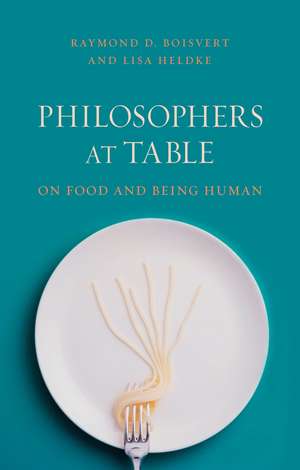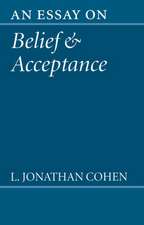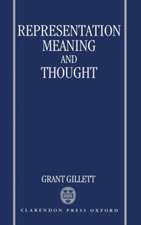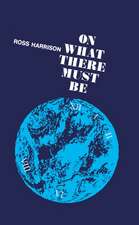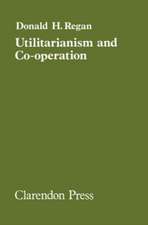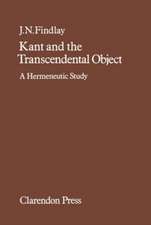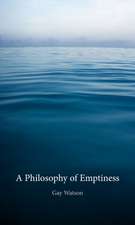Philosophers at Table: On Food and Being Human
Autor Raymond D. Boisvert, Lisa Heldkeen Limba Engleză Paperback – 15 apr 2016
When you boil it down, one of the most important things we do each day is eat. The question of eating—what, and how—may seem simple at first, but it is dense with complex meanings, reflecting myriad roles that food plays and has played over the centuries. In fact, as Raymond D. Boisvert and Lisa Heldke show in this book, it’s difficult to imagine a more philosophically charged act than eating. Philosophers at Table explores the philosophical scaffolding that supports this crucial aspect of everyday life, showing that we are not just creatures with minds, but also with stomachs.
Examining a cornucopia of literary works, myths, histories, and film—not to mention philosophical ideas—the authors make the case for a bona fide philosophy of food. They look at Babette’s Feast as an argument for hospitality as a central ethical virtue. They compare fast food in Accra to the molecular gastronomy of Spain as a way of considering the nature of food as art. And they bite into a slug—which is, unsurprisingly, completely gross—to explore tasting as a learning tool, a way of knowing. A surprising, original take on something we have not philosophically savored enough, Philosophers at Table invites readers to think in fresh ways about the simple and important act of eating.
Examining a cornucopia of literary works, myths, histories, and film—not to mention philosophical ideas—the authors make the case for a bona fide philosophy of food. They look at Babette’s Feast as an argument for hospitality as a central ethical virtue. They compare fast food in Accra to the molecular gastronomy of Spain as a way of considering the nature of food as art. And they bite into a slug—which is, unsurprisingly, completely gross—to explore tasting as a learning tool, a way of knowing. A surprising, original take on something we have not philosophically savored enough, Philosophers at Table invites readers to think in fresh ways about the simple and important act of eating.
Preț: 138.04 lei
Nou
Puncte Express: 207
Preț estimativ în valută:
26.42€ • 27.05$ • 21.97£
26.42€ • 27.05$ • 21.97£
Carte disponibilă
Livrare economică 25 februarie-11 martie
Livrare express 08-14 februarie pentru 18.72 lei
Preluare comenzi: 021 569.72.76
Specificații
ISBN-13: 9781780235882
ISBN-10: 1780235887
Pagini: 200
Dimensiuni: 140 x 216 x 13 mm
Greutate: 0.23 kg
Editura: REAKTION BOOKS
Colecția Reaktion Books
ISBN-10: 1780235887
Pagini: 200
Dimensiuni: 140 x 216 x 13 mm
Greutate: 0.23 kg
Editura: REAKTION BOOKS
Colecția Reaktion Books
Notă biografică
Raymond D. Boisvert is professor of philosophy at Siena College in Albany, New York, and the author of I Eat: Therefore I Think. Lisa Heldke is professor of philosophy at Gustavus Adolphus College in St. Peter, Minnesota and the author of Exotic Appetites: Ruminations of a Food Adventurer.
Cuprins
Introduction
1. Hospitality is Ethics
2. Food as/and Art
3. Tasting, Testing, Knowing
4. Being Hungry, Hungry Being
Conclusion: Reconstructive Surgery
References
Bibliography
Acknowledgements
Index
1. Hospitality is Ethics
2. Food as/and Art
3. Tasting, Testing, Knowing
4. Being Hungry, Hungry Being
Conclusion: Reconstructive Surgery
References
Bibliography
Acknowledgements
Index
Recenzii
“Delightful, deep but never pedantic. The great philosophers of the past are widely considered and their theories analyzed, but the goal is not to provide a historical excursus on what thinkers of the past wrote about food. The authors compare their work to plumbing in the sense that they try to understand the nuts and bolts of how things work and above all how ideas and values—often taken for granted and never fully discussed—greatly shape the way we understand and interact with the world. There is no more immediate perspective to do this than by looking at food, an experience that everybody, one way or another, shares.”
“Boisvert and Heldke are proceeding from our shared, lived experience as people with stomachs, so prior familiarity with the work of Immanuel Kant and Rene Descartes is not needed. The book is carved with that crisp, clear precision common to academic philosophy texts, never advancing any idea an inch without a concise explanation of its origin. Boisvert and Heldke’s combined voice is never haughty or self-indulgent, but instead jovially tries to reach past the classically dry, snooze-inducing language of too-tidy minds into something closer to the tone of sociology or ethnography, lush with specific anecdotal examples and some sense of humor.”
"By exposing the creaking plumbing of categorical thinking that undergirds many of our simplistic either/or notions, Boisvert and Heldke help us realize that self-sufficiency is insufficient when it comes to rebuilding community, reintegrating agriculture into culture, and our species into nature. A philosophy that starts with food may just be the way to break down the real and perceived barriers that we have erected between our mind and body, between ideas and between each other, with the overlapping and interconnection of people and ideas demonstrated."
